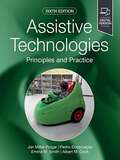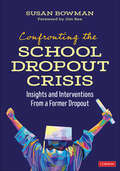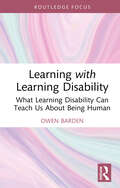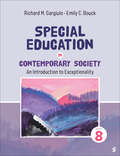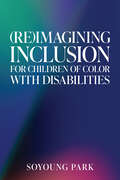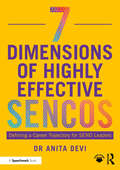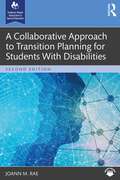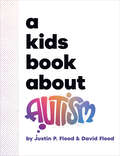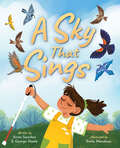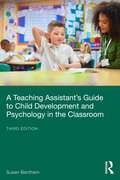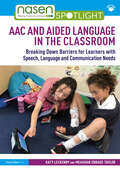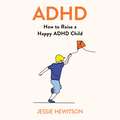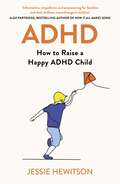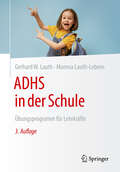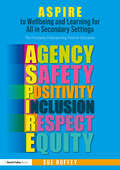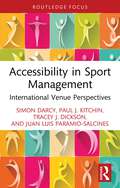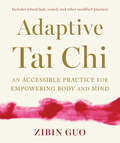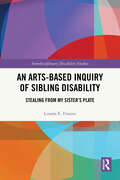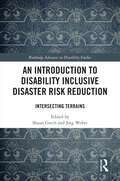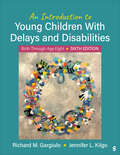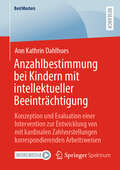- Table View
- List View
Assistive Technologies: Principles and Practice
by Emma Smith Albert M. Cook Janice Miller Polgar Pedro EncarnaçãoMaster the assistive strategies you need to make confident clinical decisions and help improve the quality of life for people with disabilities. Based on the Human Activity Assistive Technology (HAAT) model developed by Albert Cook, Sue Hussey, and Janice Polgar, Assistive Technologies: Principles and Practice, 6th Edition, provides detailed coverage of the broad range of devices, services, and practices that comprise assistive technology. This text offers a systematic process for ensuring the effective application of assistive technologies — and focuses on the relationship between the human user and the assisted activity within specific contexts. New to this edition is updated and expanded content on autonomous features of wheelchairs and vehicles, electronic aids to daily living, robotics, sustainability issues related to assistive technology, and much more.
Confronting the School Dropout Crisis: Insights and Interventions From a Former Dropout
by Susan BowmanReach out before they drop out Student dropout rates continue to soar, despite decades of funding, research, programs, and professional development initiatives. This is a wakeup call. Written by a former school dropout, Confronting the School Dropout Crisis encourages educators and related professionals to discover and explore the sometimes unnoticed reasons that youth drop out of school. With fresh strategies for prevention and intervention, this critical resource includes: How to reach and recover students who are at risk of dropping out or who already have Clear, impactful strategies that better engage and positively impact students who are at risk Moving personal stories from teens and the author Confronting the School Dropout Crisis invites you to rethink how you address real dropout issues with young people and how to incorporate fresh approaches to better reach and positively impact these students and their caregivers—before it’s too late.
Confronting the School Dropout Crisis: Insights and Interventions From a Former Dropout
by Susan BowmanReach out before they drop out Student dropout rates continue to soar, despite decades of funding, research, programs, and professional development initiatives. This is a wakeup call. Written by a former school dropout, Confronting the School Dropout Crisis encourages educators and related professionals to discover and explore the sometimes unnoticed reasons that youth drop out of school. With fresh strategies for prevention and intervention, this critical resource includes: How to reach and recover students who are at risk of dropping out or who already have Clear, impactful strategies that better engage and positively impact students who are at risk Moving personal stories from teens and the author Confronting the School Dropout Crisis invites you to rethink how you address real dropout issues with young people and how to incorporate fresh approaches to better reach and positively impact these students and their caregivers—before it’s too late.
Learning with Learning Disability: What Learning Disability Can Teach Us About Being Human (Autocritical Disability Studies)
by Owen BardenThis book uses the concept of “learning disability” to explore what it means to be human. It argues that we need to learn with rather than from or about learning disability. This crucial distinction means being open to what learning disability can teach us about what it means to be human. This approach comes from recognising learning disability as an organising concept – a concept which radically transforms our sense of what it means to be – or not be – a person.After reflecting on the author’s relationship to learning disability, the book explores relationships and tensions between conceptualisations of learning disability and of the human. Through historical ontology, the book initially examines how the phenomenon of “learning disability” came into being. It then explores ways in which the concept of learning disability has, over the course of the 20th and 21st centuries, radically transformed our sense not only of education and learning, but also of who is or is not deemed entitled to full citizenship and the associated rights, and so who is or is not fully human. Each chapter of the book exposes tensions and contradictions apparent in the ways we tend to think about personhood and learning disability, illuminating them through a series a binary oppositions: human and not fully human; menacing and vulnerable; controlled and abandoned; capable and incapable; human and posthuman.The book concludes by drawing together these tensions and contradictions to challenge the prevailing metanarrative of disability and make the case for a more inclusive conceptualisation of what it means to be human.It will be of interest to all scholars and students of disability studies, the history of learning disability, humanism and posthumanism, and learning disability advocacy.
Special Education in Contemporary Society: An Introduction to Exceptionality
by Richard M. Gargiulo Emily C. BouckSpecial Education in Contemporary Society: An Introduction to Exceptionality offers a comprehensive, engaging, and readable introduction to the dynamic field of special education. Grounded in the latest research, it reflects current educational standards and equips students with the knowledge, skills, attitudes, and beliefs needed to create inclusive learning environments that empower all students to reach their full potential. Authors Richard M. Gargiulo and Emily C. Bouck encourage a deep awareness and understanding of the "human" side of special education, offering insightful perspectives into the lives of exceptional students, their families, and the dedicated teachers who support them. The Eighth Edition of this text has been updated with new information on specific disabilities and challenges, issues of diversity and equity within special education, and the latest statistics and research that are a hallmark of this book.
Special Education in Contemporary Society: An Introduction to Exceptionality
by Richard M. Gargiulo Emily C. BouckSpecial Education in Contemporary Society: An Introduction to Exceptionality offers a comprehensive, engaging, and readable introduction to the dynamic field of special education. Grounded in the latest research, it reflects current educational standards and equips students with the knowledge, skills, attitudes, and beliefs needed to create inclusive learning environments that empower all students to reach their full potential. Authors Richard M. Gargiulo and Emily C. Bouck encourage a deep awareness and understanding of the "human" side of special education, offering insightful perspectives into the lives of exceptional students, their families, and the dedicated teachers who support them. The Eighth Edition of this text has been updated with new information on specific disabilities and challenges, issues of diversity and equity within special education, and the latest statistics and research that are a hallmark of this book.
(Re)Imagining Inclusion for Children of Color with Disabilities
by Soyoung ParkA transformative vision to shift educator practice and make systemic changes that can advance educational inclusion of students of color with disabilities
7 Dimensions of Highly Effective SENCOs: Defining a Career Trajectory for SEND Leaders
by Anita DeviThis accessible and empowering book helps SENCOs and their line managers to define what leadership of SEND means in practice and how SENCOs can continue to grow and develop in their role. Combatting the lack of clarity, identity and agency often associated with the position, the book defines career aspirations for future and practicing SENCOs. It examines the SEND leader trajectory from initial teacher training to advanced leadership using an evidence-based model and practical tools to measure strengths and further areas for development. The book is divided into two parts, first examining the SENCO role before focusing on seven ‘habits’ needed to maximise effectiveness.Chapters include: Original research broken down into an accessible and impactful guidance reference for use in schools. Spaces for reflection to help readers build a sense of identity, agency and power. Top tips to support recruitment and retention, as well as unpacking the role to consider pressure points, strengths and challenges from a task-based perspective. A wealth of case studies, vignettes and quotes outlining what working in and with the SLT entails, as well as an exploration into the difference between SEND strategy and long-term planning. An analysis of seven key skills for the SENCO/SEND leader role, with suggestions for developing these to grow and succeed. With advice on leveraging agency and managing power to improve standards of delivery and drive positive change, this book is essential reading for both experienced and trainee SENCOs looking to build a successful career, as well as teachers transitioning to the role. It is a useful tool for leaders with little experience in SEND who are line-managing SENCOs and will also be valuable reading for headteachers and MAT leaders.
A Collaborative Approach to Transition Planning for Students With Disabilities (Evidence-Based Instruction in Special Education)
by JoAnn M. RaeThe book’s framework is specially designed to advance students’ involvement and participation in their lives, not only in the presence of the most severe sensory and intellectual disabilities, but also in the case of multiple disabilities. Unique scenarios not typically seen in other textbooks, such as IEP team disagreements, students with terminal illnesses, students with ill or overworked parents, or students living in poverty are also explored.This updated edition also includes: Descriptions of research-based practices to maximize students’ self-determination, autonomy, goal setting, and ability to have successful life experiences Opportunities to integrate knowledge with practice by providing strategies that relate to the real-life difficulties students and transition planning specialists may encounter Easy-to-replicate communication tools, such as letters to students and parents, as examples to enhance collaboration Methods for teachers to effectively promote and increase student involvement and collaboration by using structured and interactive interviews Guidance aligned with the most up-to-date special education law A Collaborative Approach to Transition Planning for Students with Disabilities reflects the universal challenges that teachers, families, and finally, the students themselves face, as they progress through school with a disability. For students with disabilities, the key component to successful transition planning is creating a collaborative atmosphere that allows them to be successful. This book promises to serve as an essential resource to all who are dedicated to that goal.
A Kids Book About Autism (A Kids Book)
by Justin Flood David FloodKickstart your journey towards a better understanding of autism and those affected by it.This is a kids’ book about autism. Autism spectrum disorder (ASD) is something that affects kids and families all over the world.This book helps kids aged 5-9 better understand what autism is and how it affects us. It dives into what it's like to live with autism while reminding us that at the core, we're not that different from one another after all.A Kids Book About Autism features: A large and bold, yet minimalist font design that allows kids freedom to imagine themselves in the words on the pages.A friendly, approachable, empowering, and child-appropriate tone throughout.An incredible and diverse group of authors in the series who are experts or have first-hand experience of the topic.Tackling important discourse together! The A Kids Book About entries are best used when read together. Helping to kickstart challenging, empowering, and important conversations for kids and their grownups through beautiful and thought-provoking pages. The series supports an incredible and diverse group of authors who are either experts in their field or have first-hand experience on the topic. A Kids Co. is a new kind of media company that enables kids to explore big topics in a new and engaging way, with a growing series of books, podcasts, and blogs made to empower. Learn more about us online by searching for A Kids Co.
A Sky That Sings
by Anita Sanchez George SteeleMia, a blind girl who enjoys identifying birds by their distinct calls and songs, leads her aunt through the park on a bird-listening adventure!Mia and her tía are spending a sunny afternoon at the park bird-listening! Some people enjoy bird-watching but as a blind person, Mia uses her other senses to identify different birds by their unique calls and songs. She calls it bird-listening. Mia loves naming each of the birds that she hears. Sweet! Sweet! Sweet! Is that the chipper call of a yellow warbler? At first Mia's aunt doesn't know what to expect, but with Mia's guidance, she learns to listen and enjoy the bright melodies pouring from the sky. Their adventure will take them past a lively pond, through the hush of the quiet woods, and up a breezy hilltop for a soaring encounter with Mia's favorite bird of all! Perfect for bird lovers of every feather, A Sky That Sings invites us to open our senses to life's everyday treasures--the delights of nature and spending time with loved ones.
A Teaching Assistant’s Guide to Child Development and Psychology in the Classroom
by Susan BenthamHow can you help students most effectively in the classroom? As a teaching assistant, you play a vital role in today’s schools. This fully updated third edition will help you get to grips with the main issues to do with psychology and its role in the processes of teaching and learning.This accessible text provides informative, yet down-to-earth commentary with clear examples of how you can apply this knowledge in everyday practice. This book addresses issues such as how to support learning and behaviour, how to create an optimal learning environment for all students, ways to encourage pupil voice, supportive strategies for children with additional needs, and how to help children with their self-esteem and independence. This new edition includes references to up-to-date research in child development and psychology to include information regarding wellbeing, mental health, and learning strategies related to insights from cognitive science. Chapters are complemented with lively case studies, self-assessment questions, and examples of how to apply theory to everyday classroom practice. The reader is encouraged to develop reflective practice to best support children’s behaviour and learning.This reader-friendly book is an invaluable companion for every teaching assistant, HLTA, pastoral support assistant, learning mentor, classroom cover supervisor and anyone working in a supporting role in an educational setting.
AAC and Aided Language in the Classroom: Breaking Down Barriers for Learners with Speech, Language and Communication Needs (nasen spotlight)
by Katy Leckenby Meaghan Ebbage-TaylorHave you got learners in your class who have Speech, Language, and Communication Needs (SLCNs) who would benefit from resources to support their communication skills, such as using Aided Language/ Augmentative and Alternative Communication (AAC)?This empowering book is designed with these questions at its heart. Written in an accessible style, by teachers for teachers, it offers guidance and support to help you to overcome barriers and successfully implement AAC. The book: Addresses myths and misconceptions, with discussion points to encourage the reader to reflect on their own practice. Shares the current evidence base around successful support strategies. Includes easy to implement, practical strategies that can be adopted in any classroom to have maximum impact and enhance learners’ communication skills. Contains a wealth of relatable, real-life examples and case studies included throughout, to bring theory to life and help you deliver effective classroom practice and support your learners with SLCN. Clearly outlines the variety of different assistive technologies available for facilitating communication. Providing readers with a range of useful tools and resources to implement Aided Language/AAC, AAC and Aided Language in the Classroom builds practitioners’ confidence and enables educators to provide a universal level of support for learners with SLCN. It is valuable reading for school leaders, SENCOs, teachers, and learning support assistants, as well as speech and language therapists supporting educators with the implementation of Aided Language/ AAC.
ADHD: How to Raise a Happy ADHD Child
by Jessie HewitsonInformative, empathetic and empowering for families and their brilliant neurodivergent children. Alex Partridge, bestselling author of Now It All Makes SenseA must-read for every parent or teacher of a child with ADHD. Lisa Lloyd, bestselling author of Raising the SEN-BetweenersIs your ADHD child struggling at school? Do they make friends, but find it difficult to keep them? Do your attempts to get them off their screens end in tears (and that's just you)? Jessie Hewitson, award-winning journalist, ADHDer and parent to two fantastically neurodivergent children, has been there.Here she asks whether ADHD is over diagnosed, is medication the solution, and how can parents best support ADHD kids to become the happiest version of themselves at school, in their friendships, and at home.For more than a decade Jessie has been on a quest to better understand neurodivergent happiness and the many barriers young ADHD people face in finding it. Now she shares everything she has learned, including interviews with world-leading scientists, researchers and experts in the field. Combined with her own personal experience, ADHD will empower you to centre happiness in what can be a more complicated and ultimately more rewarding parenting journey.
ADHD: How to Raise a Happy ADHD Child
by Jessie HewitsonInformative, empathetic and empowering for families and their brilliant neurodivergent children. Alex Partridge, bestselling author of Now It All Makes SenseA must-read for every parent or teacher of a child with ADHD. Lisa Lloyd, bestselling author of Raising the SEN-BetweenersIs your ADHD child struggling at school? Do they make friends, but find it difficult to keep them? Do your attempts to get them off their screens end in tears (and that's just you)? Jessie Hewitson, award-winning journalist, ADHDer and parent to two fantastically neurodivergent children, has been there.Here she asks whether ADHD is over diagnosed, is medication the solution, and how can parents best support ADHD kids to become the happiest version of themselves at school, in their friendships, and at home.For more than a decade Jessie has been on a quest to better understand neurodivergent happiness and the many barriers young ADHD people face in finding it. Now she shares everything she has learned, including interviews with world-leading scientists, researchers and experts in the field. Combined with her own personal experience, ADHD will empower you to centre happiness in what can be a more complicated and ultimately more rewarding parenting journey.
ADHD: How to Raise a Happy ADHD Child
by Jessie HewitsonInformative, empathetic and empowering for families and their brilliant neurodivergent children. Alex Partridge, bestselling author of Now It All Makes SenseA must-read for every parent or teacher of a child with ADHD. Lisa Lloyd, bestselling author of Raising the SEN-BetweenersIs your ADHD child struggling at school? Do they make friends, but find it difficult to keep them? Do your attempts to get them off their screens end in tears (and that's just you)? Jessie Hewitson, award-winning journalist, ADHDer and parent to two fantastically neurodivergent children, has been there.Here she asks whether ADHD is over diagnosed, is medication the solution, and how can parents best support ADHD kids to become the happiest version of themselves at school, in their friendships, and at home.For more than a decade Jessie has been on a quest to better understand neurodivergent happiness and the many barriers young ADHD people face in finding it. Now she shares everything she has learned, including interviews with world-leading scientists, researchers and experts in the field. Combined with her own personal experience, ADHD will empower you to centre happiness in what can be a more complicated and ultimately more rewarding parenting journey.
ADHS in der Schule: Übungsprogramm für Lehrkräfte
by Gerhard W. Lauth Morena Lauth-LebensKinder und Jugendliche mit ADHS haben es in der Schule oft schwer. Dieses Buch präsentiert die neuesten wissenschaftlichen Erkenntnisse und bietet ein praxiserprobtes Programm zur Begleitung und Förderung dieser Schülerinnen und Schüler. Es richtet sich an Lehrpersonen in Schule und Beruf sowie an Schulberater, Schulsozialarbeiter und Integrationshelfer. Das Programm kann unter verschiedenen Bedingungen angeboten werden: Leiterinnen-Gruppe: Eine Gruppe unter der Leitung einer erfahrenen Pädagogin. Kollegiale Gruppe: 2-3 Lehrkräfte arbeiten gemeinsam an der Umsetzung. Schulinterne Gruppe: Das Programm wird innerhalb der Schule koordiniert. Interdisziplinäre Gruppe: Lehrpersonen aus verschiedenen Schulen oder Arbeitsbereichen tauschen sich aus und entwickeln Maßnahmen. Das Förderprogramm wird unmittelbar mit der eigenen Praxis verknüpft. Hierzu wird ein „Zielkind“ festgelegt, das die Teilnehmenden aktuell unterrichten oder begleiten. Alle Erörterungen finden an seinem Beispiel statt; alle Maßnahmen werden auf seine Situation zugeschnitten und übertragen. Das Programm fördert in verschiedenen Bausteinen ein grundlegendes Verständnis für ADHS, analysiert schwierige Verhaltensweisen und identifiziert Stärken des Kindes. Es ergründet, wie vorteilhaftes Verhalten verstärkt werden kann, und zeigt auf, wie die Lehrkraft vorausschauend lenken kann. Zudem werden Strategien aufgezeigt, wie der Schüler oder die Schülerin in ihrem Lernen unterstützt werden kann und wie die Zusammenarbeit mit Eltern gelingt. Das entwickelte Übungsprogramm wird inkl. Arbeitsmaterialien in diesem Buch so ausführlich vorgestellt, dass Übungsleitende und Lehrkräfte es unmittelbar anwenden können. Ein unverzichtbarer Ratgeber für alle, die sich für die individuelle Förderung von Schülerinnen und Schülern mit ADHS interessieren.
ASPIRE to Wellbeing and Learning for All in Secondary Settings: The Principles Underpinning Positive Education
by Sue RoffeyThis truly accessible resource shows secondary school practitioners how to help make every child and young person feel like they really matter when they are in school, so they can develop confidence, resilience, love of learning, a positive sense of self and healthy relationships. Sue Roffey shows how to create a learning environment where all pupils can thrive and make progress in learning, and where wellbeing for everyone is at the heart of every school. By using the unique evidence-based ASPIRE principles of Agency, Safety, Positivity, Inclusion, Respect and Equity in practice, this insightful book shows teachers how to redress the balance in ways that maximise a love for learning, build a positive sense of self, construct healthy relationships, foster resilience and help young people make good choices. This resource features a chapter for each principle which explores what this means, why it matters and how it can be applied across secondary schools. Although visionary, the book is based on both substantial evidence and good practice, with each chapter supported by case-studies across the world. The book demonstrates the positive difference each principle makes to children in secondary school settings as well as teachers, parents and the overall community. It is a must-read for secondary school teachers, tutors, school leaders, psychologists, parents and anyone who wants an education system that is inclusive, holistic and effective for all students.
Accessibility in Sport Management: International Venue Perspectives (European Association for Sport Management Series)
by Tracey J. Dickson Simon Darcy Paul J. Kitchin Juan Luis Paramio-SalcinesThis book introduces the fundamental principles of accessible and inclusive sport venue management, with a focus on people with disability. It offers a social‑ecological analysis of how governments, businesses, the disability social movement, sports organisations, and their stakeholders can, and should, make sport more accessible and inclusive.Using a critical disability studies perspective, this book highlights recent global human rights initiatives, challenges, and ongoing resistance to the drive for accessibility in sport venue management. Drawing on the latest research, it takes a step‑by‑step look at the sporting experience – including pre‑experience planning, travel to and from an event, the built environment, the experience itself, and online participation – and considers how each phase might be made more accessible and inclusive, and how commercial and social justice considerations intersect.Addressing the needs of participants, consumers, employees, volunteers, and organisations, this book is essential reading for any student, researcher, practitioner, or policymaker with an interest in sport management, disability sport, event management, corporate social responsibility, disability studies, or human rights.
Adaptive Tai Chi: An Accessible Practice for Empowering Body and Mind
by Zibin GuoA simple and inclusive Tai Chi program, completely modifiable with helpful illustrations, that empowers people of all physical abilities to experience the transformative qualities of this art. Includes sequences for standing/moving, stationary standing, seated, and wheelchair.In Tai Chi Chuan, the traditional Chinese martial and healing art, we learn to overcome challenges by empowering the mind and transforming the body. Adaptive Tai Chi offers an innovative approach that speaks to this powerful idea and makes Tai Chi accessible and beneficial to people with a range of physical conditions or ambulatory impairment.The slow, circular, flowing, and graceful movements of Tai Chi require little space and no equipment, making it an ideal practice for people with different physical abilities (it&’s been included in the Paralympics since 2008). Adaptive Tai Chi introduces readers to the culture, philosophy, and physiology of Tai Chi—and gives readers four completely illustrated practices, each modified for different physical abilities, including conventional standing/moving, stationary standing, seated, and wheelchair sequences.Along with the complete illustrated adaptive Tai Chi sequences, Guo includes notes and philosophical insights into each practice. The complete program offered in Adaptive Tai Chi allows everyone to access the profound benefits of Tai Chi practice.
An Arts-Based Inquiry of Sibling Disability: Stealing from My Sister’s Plate (Interdisciplinary Disability Studies)
by Linnéa E. FranitsThis book examines texts and other artistic products rendered by siblings of individuals with disabilities in order to interrogate the impact of disability on the identity of non-disabled siblings. This includes an arts-based analysis of the author’s own experiences as the sister of a woman with disabilities as depicted in photo essays and autoethnographic texts. By providing an alternate presentation of the topics surrounding sibling disability it gives readers a deeper and broader perspective of the lived experience of sibling disability by introducing them to some of the knowledge that is specifically, and perhaps singularly available to siblings of people with disabilities. Presenting findings from narrative analysis, visual analysis, autoethnographic and arts-based research related to sibling disability, it challenges the grand narratives that persist in many cultural products and medical discourses around sibling disability.It will be of interest to all scholars and students of disability studies, sociology, childhood studies, family studies and the arts more broadly.
An Introduction to Disability Inclusive Disaster Risk Reduction: Intersecting Terrains (Routledge Advances in Disability Studies)
by Shaun Grech Jörg WeberThis first of its kind volume introduces Disability Inclusive Disaster Risk Reduction (DIDRR) in unprecedented critical and interdisciplinary ways covering the complex conceptual, theoretical and practice terrain. Established and emerging scholars and practitioners introduce and probe key discourses, theory, policy and practice at the intersections of disability, disasters and disaster risk reduction, navigating compound and dynamic areas including climate change, governance, wars and conflict, forced migration, disability representation, geopolitics, gender and ethnicity. This edited book lays out and questions established policies, discourses and practices in mainstream areas including Disaster Risk Reduction, Disaster Risk Management and Humanitarian Action, opening an effective critical debate to understand, challenge and shift dominant paradigms. By developing new theory on DIDRR, it will serve as an important tool for academics, researchers and practitioners working in multiple fields including disability studies, disaster management, global health, humanitarian studies, international studies and geography among others.
An Introduction to Young Children With Delays and Disabilities: Birth Through Age Eight
by Richard M. Gargiulo Jennifer L. KilgoAn Introduction to Young Children With Delays and Disabilities: Birth Through Age Eight introduces readers to educational policies, services, and practices for future educators serving young children birth through age eight with delays and disabilities in early intervention/early childhood special education (EI/ECSE). Thoughtfully and comprehensively addressing the needs of young children and their families, authors Richard M. Gargiulo and Jennifer L. Kilgo offer interventions and instructional techniques that provide students with a broad understanding of important theoretical and philosophical foundations, including evidence-based decision making, cultural and linguistic responsiveness, and appropriate instruction and interventions in classroom settings and beyond. The Sixth Edition has been thoroughly updated to incorporate the Initial Practice-Based Professional Preparation Standards for Early Interventionists/Early Childhood Special Educators developed by the Division for Early Childhood (DEC) and Council for Exceptional Children (CEC) in 2020, as well as the DEC Recommended Practices.
An Introduction to Young Children With Delays and Disabilities: Birth Through Age Eight
by Richard M. Gargiulo Jennifer L. KilgoAn Introduction to Young Children With Delays and Disabilities: Birth Through Age Eight introduces readers to educational policies, services, and practices for future educators serving young children birth through age eight with delays and disabilities in early intervention/early childhood special education (EI/ECSE). Thoughtfully and comprehensively addressing the needs of young children and their families, authors Richard M. Gargiulo and Jennifer L. Kilgo offer interventions and instructional techniques that provide students with a broad understanding of important theoretical and philosophical foundations, including evidence-based decision making, cultural and linguistic responsiveness, and appropriate instruction and interventions in classroom settings and beyond. The Sixth Edition has been thoroughly updated to incorporate the Initial Practice-Based Professional Preparation Standards for Early Interventionists/Early Childhood Special Educators developed by the Division for Early Childhood (DEC) and Council for Exceptional Children (CEC) in 2020, as well as the DEC Recommended Practices.
Anzahlbestimmung bei Kindern mit intellektueller Beeinträchtigung: Konzeption und Evaluation einer Intervention zur Entwicklung von mit kardinalen Zahlvorstellungen korrespondierenden Arbeitsweisen (BestMasters)
by Ann Kathrin DahlhuesIm Rahmen des Forschungsprojektes wird der Frage nachgegangen, wie sich die Arbeitsweisen zur Anzahlbestimmung bei Kindern mit intellektueller Beeinträchtigung unter Berücksichtigung der kardinalen Zahlvorstellung während einer Förderung der Menge-Zahl-Zuordnung entwickeln. Dabei liegt der Fokus auf der Bestimmung strukturiert dargestellten Anzahlen innerhalb des Zwanzigerfeldes. Um diese Frage beantworten zu können, wurde eine Einzelfallstudie mit zwei Kindern des dritten Schulbesuchsjahres einer Förderschule mit dem Schwerpunkt geistige Entwicklung durchgeführt (ZR6 und ZR20). Die Studie umfasste eine Prä- und Post-Standortanalyse, Einzelfördereinheiten sowie Verlaufstestungen. Der Fokus der Fördereinheiten lag auf der Mengenwahrnehmung, dem Zählen und der Herstellung von Beziehungen zwischen den Zahlen unter Berücksichtigung des intermodalen Transfers. Es zeigt sich, dass die Kinder strukturiert dargestellte Anzahlen nicht mehr immer zählend beantworten, sondern überwiegend die direkte Anzahlnennung nutzen. Auch die Strukturen des Zwanzigerfeldes können immer mehr erkannt und genutzt werden. Dennoch gibt es sowohl Schwankungen in der Lösungshäufigkeit als auch in der Lösungsgeschwindigkeit.
